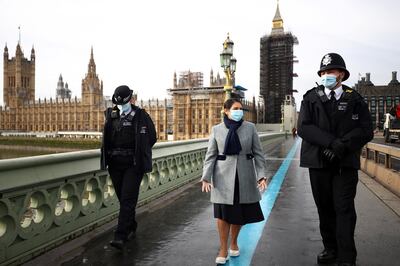Teachers, police officers and shop workers could be prioritised for coronavirus vaccines in the next phase of the UK's inoculation campaign, a government minister said on Monday.
England started offering doses to more than five million people aged 70 and above and those considered extremely vulnerable on the same day.
The vaccination programme, Europe's biggest, has until now focused on people aged 80 and older, as well as front-line health and care staff.
In Germany, Foreign Minister Heiko Maas suggested people who had been inoculated against the virus should be able to go back to restaurants and cinemas before others.
UK Vaccines Minister Nadhim Zahawi said key workers who were not offered the vaccine in the first round should be prioritised in the second phase. He cited teachers, police officers and shop workers as priority professions.
"My very strong instinct is those who through no fault of their own ... are much more likely to come into contact with the virus should be prioritised," he told Sky News.
The UK has so far vaccinated more than four million people but health chiefs said the programme would not reduce hospital admissions "for many weeks to come".
The number of people in UK hospitals from Covid-19 is the highest that it has been throughout the pandemic, with one person admitted to hospital every 30 seconds, UK Health Secretary Matt Hancock said on Monday.
“It takes a week or two after the first vaccination to start to develop immunity against the virus, so we don’t expect that we will see an impact on the NHS until into February," National Health Service medical director Prof Stephen Powis said.
Home Secretary Priti Patel warned coronavirus rule-breakers that “actions have consequences”, signalling that the guidelines would be more strictly enforced.
Asked if that meant existing rules were not having an impact and tougher measures would be needed, Ms Patel said: “No, the focus has to be on compliance and enforcement of the regulations and the rules as they stand.”
Earlier, Prime Minister Boris Johnson said the expansion of the programme was a "significant milestone" in the race to vaccinate the country.
Ten new mass vaccination centres were opening on Monday, adding to the seven already in operation, each capable of inoculating thousands a day. Vaccination is also available at about 1,200 hospitals and GP services.
Mr Zahawi said 24-hour vaccination centres would be trialled in London by the end of the month.
On Sunday, the government said more than half of over-80s had received their first dose of the vaccine, prompting the programme's expansion.
"Today is a significant milestone in our vaccination programme as we open it up to millions more people who are most at risk from Covid-19," Mr Johnson said.
"We have a long way to go and there will doubtless be challenges ahead, but by working together we are making huge progress in our fight against this virus."
However, Mr Zahawi warned the UK might face vaccine supply shortages after Pfizer announced it would temporarily scale back manufacturing while changes were made to boost capacity.
"There's bound to be delays. Any new manufacturing process has challenges at the outset, it is lumpy, it begins to stabilise and get better and better week in, week out," Mr Zahawi told BBC Radio 4's Today programme.
"The Pfizer-BioNTech vaccine is a messenger RNA chemical, a difficult chemical to manufacture, very, very challenging but they're doing really well. They, they want to do more, which is why they're reconfiguring to add volume to the whole world.
"That could delay supply but I'm confident we can meet our target."
Ministers hope to reach a target of vaccinating the 15 million most vulnerable people with at least one dose by February 15. These four groups account for 88 per cent of deaths.
Foreign Secretary Dominic Raab pledged that all adults would be offered a first vaccination by September.
Britain, which has Europe's highest Covid-19 death toll, hopes progress with vaccines will enable it to ease some of the economically damaging lockdown restrictions in March.
"If we can do it faster than that, great," Mr Raab said. "But that's the road map."
The government said that the first two groups – care home residents and over-80s – would remain a priority, but vaccination sites that could take more people would call on members of the next two groups for their shots.
It was announced on Sunday that a further 671 people died from Covid-19, the highest Sunday increase. Another 38,598 positive cases were reported.
Researchers found that almost a third of recovered Covid patients are readmitted to hospital within five months and up to one in eight go on to die of Covid-related complications.
The Leicester University and Office for National Statistics study found that out of 47,780 people discharged from hospital in the first wave, 29.4 per cent returned to hospital within 140 days and 12.3 per cent died.
























